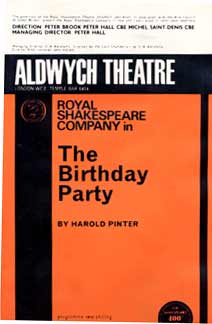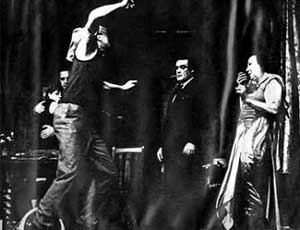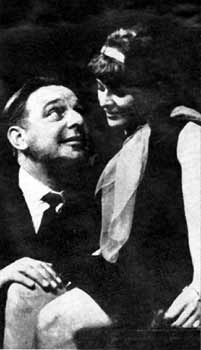
Programme Cover
|
The Birthday Party, The Royal Shakespeare Company,
Aldwych Theatre, 18th June 1964
Petey - Newton Blick
Meg - Doris Hare
Stanley - Bryan Pringle
Lulu - Janet Suzman
Goldberg - Brewster Mason
McCann - Patrick Magee
Directed by Harold Pinter
Designer - Ralph Koltai
Trial by Laughter
J.W.Lambert
At the Aldwych Theatre last Thursday night the Royal Shakespeare
Company banished babel. After the excitements and the disappointments
- of the World Theatre season, it resumed occupation of its London
home wiht Harold Pinter's relatively early play The Birthday Party;
the first of six productions, all but one of which are unremittingly
up to the minute in temper. English is spoken once again; but the
theatrical languages deployed are alikely to remain womthing of
a challenge.
The march of progress, or the wheel of fashion, all it what you
will, has greatly changed Harold Pinter's position since The Birthday
Party was first seen in London, and curtly rejected in 1958.; The
audience which assembled for this production of The Birthday Party
did so in a spirit very different from that of its predecessor six
years ago. Its response was measurable in terms of its laughter;
of which three distinct varieties could be distinguished on the
opening night.
First, inevitable, the Laughter of Sycophancy, to be endured everywhere
from the Royal Court to Stratford East by way of the Whitehall and
the Establishemnt; a sharp, brittle, patchy laughter, automatic
reflex of fashion's yesmen.
Second, the Laughter of Unease, produced by people of established
tastes and tentative goodwill towards womthing strange. Feeling
their defences against themselves being undermined by palpable absurdity,
they hopefully go along with their destroyer, and laugh with docile
apprehension at the salutary of bizarre image of their own failings.
Third, and of course rarest, the Laughter of Acceptance-the easy
response of thos for whom the dramatist and his players perfectly
embody their own implicit assumptions about humanity.
The measure of a dramatist's stature is the degree in which his
work succeeds in transforming laughters of the second class into
laughters of the third class; and perhaps even more important, the
degree in which he turns out to have been prophetic, to have written
plays which future generations will find easily acceptable and richly
satisfying.

Janet Suzmann. Brewster Mason,
Brian Pringle, Patrick Magee and Doris Hare |
The Caretaker alone would, I am certain ensure Mr
Pinter's success in the second of these achievements. The return
of the Birthday Party besides offering an evening of crepitant low-jinks
is reassuring, too; it makes plain the immense development in depth
and resonance which took place between the writing of these two
plays.
Already in The Birthday Party, Mr Pinter displayed an exhilarating
mastery of dramatic tension; but on the strength of this play and
most of the one-act pieces it would be possible to feel that he
was concerned only to turn over, with ominous relish, the grubbier
stones in the endless ditch of human experience.
In the scruffy seaside house the elderly deck-chair attendant potters
numbly, only once to be shaken for a moment out of his zombielike
progress through time. His bat-witted sluttish wife chatters incompetently
dosn her tiny domestic groove, stirred only by an ambigusou fondness
for their lodger, Stanley. And Stanley, who once played the piano
for a concert-party, drifts through a dream of persecution, his
only amusment mildly terrifying his landlady.
But then it is his turn to be terrified, when Goldberg the expansive
Jew and McCann the knotted Irishman appear. It is only at this point
that the play begins too. His own producer, Mr Pinter takes us through
his scene-setting at his customary smail’s pace. With the arrival
of emigmatic evil, fermentation begins. The exchanges between Goldberg
the man of power and McCann the man of violence jar the nerves;
and their alliance against Stanley, forcing him to stay when he
wants to leace, forcing him to go when he wants leave, forcing him
to sit, their frightful looming threat, their sudden demonstration
of brutality, even Stanley’s feeble resistance, are worked out in
terms of movement, speech and silence with a thrilling balance.

Brewster Mason and Janet
Suzmann |
Stanley's retreat into the childlike is horribly
counterpointed by their sentimental nostalgia at the dreadful party
itself, whiere the foolish old woman and a vapid girl drift, in
idiot gaiety and flattered sexual triviality, all unaware through
the mounting hysteria of the three men-which breaks in darkness
and wild laughter, leacing Stanley literally struck dumb, and even
the other two adrift in savage misery.
Those who don't know the play or Pinter's work as a whole, may well
be wondering how in the world laughter is conceivable in this shabby
and sadistic context. It is conceivable, indeed it is irresistible,
because into each of these crapulous puppets Mr Pinter injects an
essence of the everyday; and because he plucks from human behaviour
precisely this elemts of blind stupidity, wilful self-deception
and instinctive cruelty which make life at once endurable and impossible;
and by their sublte juxtapositions salutes the totally absurd. This
is the strength, but also the limitation, of The Birthday Party;
those who at first recoiled form the piece were wrong in supposing
that it was merely a bad and silly play, right in sensing and dismissing
its youthfully negative and destructive core.
But in the end of course it sis a play's theatrical qualities which
will give it life; and these are aunmistakable. Taking an ill-time
holiday which it make its first brief appearance in London, I missed
the chance of being the only other dramatic critic to discern its
merits; nor can I offer odious comparisons between that performance
and this. I wish however that Doris Hare's foolish housewife, and
Newton Blick' insulated old husband, had moved bwyond their undoubted
technical address; and I cannotfeel, tought I suppose Pointer does,
that Janet Suzmann quite embraces the helpless vacuity of what might
be called a Sheila Hancock part.
As Stanley, the lost man, Bryan Pringle seens to me to pitch his
performance a touch low in the social scale; but there is a strange
authority in his confusion, and a world of cruel comedy in his useless
protest as he lumbers from side to side of the scene, strathcing
out his neck, like an aggrieved cockeney turtle bereft of its shell.
Brewster Mason need only a slightly more consistently chick tongue
to project the full essence of Goldberg's hideous power, larded
with cheap charm; and in his delivery of the birthday speech throws
off the finest piece of vocal colorata currently to be heard in
the West End.
And Patrick Magee, unrecognisably shipshape in an auburn wig and
a collar and tie, makes the killer McCann into a superbly demonic
creature. He (at home in Beckett who is to Pinter as Shakespeare
is to Webster) gets with a flick of the eyes and a hunch of the
shoulders right to the heart of the play. Bland savagery and agonised
boredom visibly eat his heart out; and when, amid the whisky-sodden
junketings, he sings, in a voice unbelievably far removed from the
gravely obsessions of Krapp's Last Tape', come one, Paddy Reilly,
to me' Mr Pinter's terrifying blend of pathos and hatred fuses unforgettably
into the stuff of art.
The Sunday Times 21 June 1964
|




